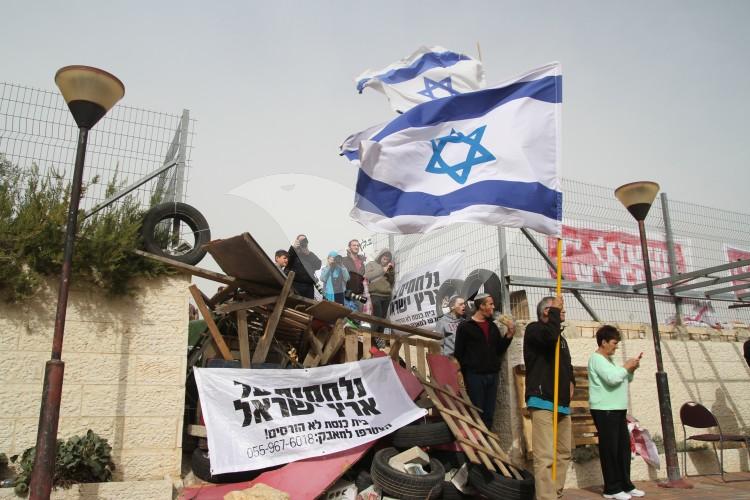Givat Ze’ev Synagogue Supporters Believe Demolition Decision is 'Unfair'
Jerusalem, 10 November, 2015 (TPS) -- JERUSALEM (TPS) – Israel’s High Court recently postponed its controversial decision to demolish the Ayelet Hashachar synagogue in the community of Givat Ze’ev outside of Jerusalem. The court ruled that the synagogue, which is to be dismantled on November 17, was built illegally upon privately owned Palestinian land.
The subject has been the center of much debate, with Israeli authorities fearing that the synagogue’s sympathizers would seek to exact revenge and respond violently to the demolition, during the current turbulent security situation.
As the final deadline approaches, protesters are showing no signs that they will budge from their position. In an interview with TPS, David Harush, the caretaker (gabbai) of the Ayelet Hashachar synagogue explained why the community is against the demolition of the synagogue, which has served Givat Ze’ev for the last 20 years.
Harush told TPS that despite the Israel High Court’s ruling that the synagogue was built on the land illegally, the land was in fact purchased legally for $68,000. Harush said that the community can prove this with original contracts and legal documents but that the High Court is depriving them of the opportunity to do so.
“The High Court, which is extremely left wing anyway, doesn’t care to check the details so they simply say they are going to destroy the building instead of coming to review the facts. But we bought it,” he told TPS.
“Instead it rushes to a decision rather than give us time to go to the courts. That is what we are angry about,” Harush elaborated.
He also insisted that a double standard was at play citing the drawn out deliberations which the High Court dedicates to decisions regarding demolition of terrorist homes. “They don’t always destroy the terrorists’ homes. They always say ‘let’s wait and see what to do’. So why don’t they wait to see what is happening with the synagogue?” Harush asked.
The doubles standard is particularly conspicuous, Harush highlighted, when one considers the findings of the NGO, Regavim, whose mission is “to ensure responsible, legal, accountable use of Israel’s national lands and the return of rule of law to all areas and aspects of the land and its preservation”.
Indeed, Regavim’s Director of International Relations, Ari Briggs, claimed that the double standards of the Israel Supreme Court are actually well known to Israeli politicians and legal professionals. Briggs said that there are numerous houses of worship of other faiths for which demolishing orders exists. However, he said, the only orders which have ever been implemented are those applying to Jewish synagogues.
“We have exact examples where there have been mosques built on land such as in the Negev. There is a town called Al Zarnog which is an illegally built village on state and private land and we have found mosques built there. Even though they were built illegally and have demolition orders, the state never carries them out,” Briggs told TPS.
He described this as a common government policy which does not enforce the law equally against illegally built mosques.
When asked for an explanation for this seemingly double standard, he cited international pressure and NGOs which cause Israeli authorities to worry about how the state will be perceived. “This causes selective enforcement of the law.”
Briggs stated that the legal intricacies of the synagogue in Givat Ze’ev can be discussed in the appropriate court of law and that a ruling should normally be complied with but that the discrimination is the main cause of resentment.
“Whether this case has merits or not is not the issue. If the government was implementing the law equally across religions without discriminating against Jews we would have no problem with it,” he concluded.


